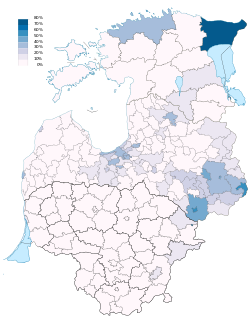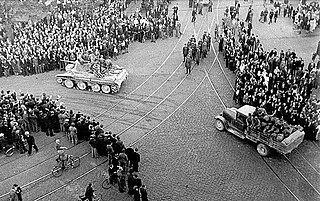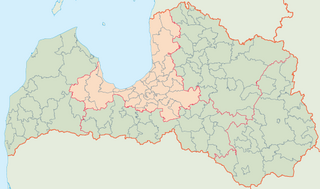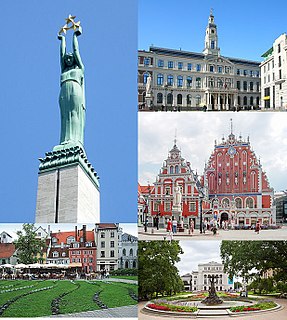
The history of Latvia began around 9000 BC with the end of the last glacial period in northern Europe. Ancient Baltic peoples arrived in the area during the second millennium BC, and four distinct tribal realms in Latvia's territory were identifiable towards the end of the first millennium AD. Latvia's principal river Daugava, was at the head of an important trade route from the Baltic region through Russia into southern Europe and the Middle East that was used by the Vikings and later Nordic and German traders.

The politics of Latvia takes place in a framework of a parliamentary representative democratic republic, whereby the Prime Minister is the head of government, and of a multi-party system. The President holds a primarily ceremonial role as Head of State. Executive power is exercised by the government. Legislative power is vested in both the government and parliament, the Saeima. The Judiciary is independent of the executive and the legislature. The Economist Intelligence Unit has rated Latvia as "flawed democracy" in 2017.

The Latvian Soviet Socialist Republic, also known as Soviet Latvia or Latvia, was a republic of the Soviet Union.

The Latvian Social Democratic Workers' Party is a social-democratic political party in Latvia. It has a long history but is not currently represented in the parliament of Latvia.

The Latvian Russian Union (LKS) is an ethnic minority, left-wing political party in Latvia, supported mainly by ethnic Russians and other Russian-speaking minorities. The co-chairpersons of the Latvian Russian Union are Miroslav Mitrofanov, Yuriy Petropavlovsky and Tatjana Ždanoka.

For Fatherland and Freedom/LNNK was a free market national conservative political party in Latvia. In 2011, it dissolved and merged into the National Alliance.

Russians in the Baltic states describes self-identifying ethnic Russians and other primary Russian-speaking communities in Estonia, Latvia, and Lithuania, commonly referred to collectively as the Baltic states. In 2017, there were 0.9 million ethnic Russians in the Baltic States, having declined from 1.7 million in 1989, the year of the last census during the Soviet era.

Riga City Council is the government of Riga City, the capital of Latvia. It is located in the Riga Town Hall at the Town Hall Square (Rātslaukums) in the very heart of Riga. The Riga City Council consisting of 60 councilors who are elected every 4 years is established on the basis of party factions.
Russians in Latvia have been the largest ethnic minority in the country for the last two centuries. The number of Russians in Latvia more than quadrupled during the Soviet occupation of Latvia when the size of the community grew from 8.8% of the total population in 1935 (206,499) to 34.0% in 1989 (905,515). It started to decrease in size again after Latvia regained independence in 1991 falling to 25.2% at the beginning of 2018.

The Latvian Socialist Soviet Republic was a short-lived socialist republic formed during the Latvian War of Independence. It was proclaimed on 17 December 1918 with the political, economic, and military backing of Vladimir Lenin and his Bolshevik government in the Russian SFSR. The head of government was Pēteris Stučka.

The Soviet occupation of Latvia in 1940 refers, according to the European Court of Human Rights, the Government of Latvia, the United States Department of State, and the European Union, to the military occupation of the Republic of Latvia by the Soviet Union ostensibly under the provisions of the 1939 Molotov–Ribbentrop Pact with Nazi Germany.

Ainārs Šlesers is a Latvian businessman and former politician who was Deputy Prime Minister of Latvia, as well as Deputy Mayor of Riga.
Ģirts Līcis is a Latvian entrepreneur mostly known as TV presenter of Gribi būt miljonārs?, the Latvian version of Who Wants to Be a Millionaire? which he hosted from 2007 to 2008. In 2000 Līcis took a MBA from Open University Business School in Great Britain, and 2005 he was the 59th candidate out of 61 for the New Era Party in the local elections for the Riga City Council.
The General Jewish Labour Bund in Latvia was a Jewish socialist party in Latvia, adhering to the political line of the General Jewish Labour Bund and existed from 1900 until 1940, when it was banned shortly after the Soviet occupation of Latvia in 1940.

Riga Region, officially Riga Planning Region is one of five planning regions of Latvia, situated in the central part of Latvia, in and around the metropolis of Riga and along the shores of the Gulf of Riga. The state institution was founded on 12 October 2006, based on the creation of the region territory as prescribed by Regulations No. 133 of the Cabinet of Ministers as of 25 March 2003, the "Regulations on Territories of Planning Regions".

The Social Democratic Party "Harmony", also commonly referred to as Harmony (Saskaņa), is a social-democratic political party in Latvia. It is the main catch-all party of the centre-left in Latvian politics. The party was founded in 2010 as the merger of the National Harmony Party (TSP) with New Centre (JC) and the Social Democratic Party (SDP), a breakaway from the Latvian Social Democratic Workers' Party (LSDSP). At that time, all three were members of the former electoral alliance Harmony Centre. The alliance also included the communist Socialist Party of Latvia. The Daugavpils City Party merged into the party in 2011.

Terra Mariana was the official name for Medieval Livonia or Old Livonia, which was formed in the aftermath of the Livonian Crusade in the territories comprising present day Estonia and Latvia. It was established on 2 February 1207, as a principality of the Holy Roman Empire but lost this status in 1215 when proclaimed by Pope Innocent III as directly subject to the Holy See.

Honor to serve Riga! is a municipal political party located in Riga, Latvia. It was created on March 17, 2012 and is led by Andris Ameriks, the deputy mayor of Riga.

The Livonia electoral district was a constituency created for the Russian Constituent Assembly election, 1917. The electoral district covered the Livonia Governorate, as well as the parts of the Courland Governorate not under German occupation.



















